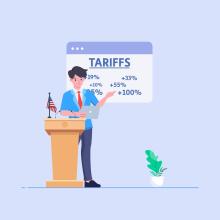Tariff Adjustments
In a change of policy, the administration last week reversed tariffs on certain food products to try to stem inflation. Tariffs do tend to increase prices because of the additional tax burden, and these costs are often passed on to the consumer.
I expect we you will continue to see adjustments on tariffs as inflation and affordability issues become a center stage Issue for consumers. You may continue to see a policy pivot as the administration adjusts policies based on current conditions.
A recent article highlighted the change in tariff levels on food products. See below.
***
Begin Quote
“U.S. President Donald Trump on Friday rolled back tariffs on more than 200 food products, including such staples as coffee, beef, bananas and orange juice, in the face of growing angst among American consumers about the high cost of groceries.
The new exemptions - which took effect retroactively at midnight on Thursday - mark a sharp reversal for Trump, who has long insisted that the sweeping import duties he imposed earlier this year are not fueling inflation.
"They may in some cases" raise prices, Trump said of his tariffs when asked about the move aboard Air Force One on Friday evening. But he insisted that overall, the U.S. has "virtually no inflation."
Democrats have won a string of victories in state and local elections in Virginia, New Jersey and New York City, where growing voter concerns about affordability, including high food prices, were a key topic.
Trump also told reporters aboard Air Force One that he would move forward with a $2,000 payment to lower- and middle-income Americans that would be funded by tariff revenues next year sometime. "The tariffs allow us to give a dividend if we want to do that. Now we're going to do a dividend and we're also reducing debt," he said.”
End Quote


